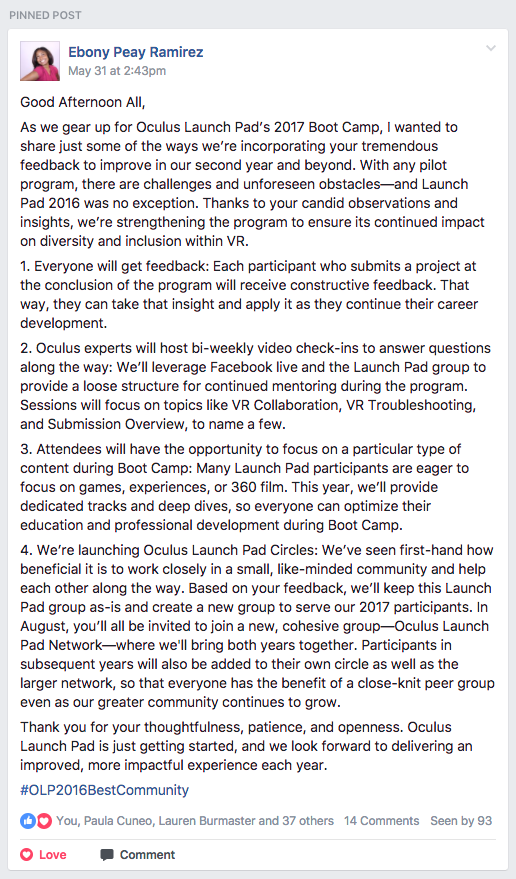![]() In March 2016, Oculus announced their Oculus Launchpad program with the idea that in order for VR to be successful, then there needs to be a diverse range of content created from diverse set of creators who are informed by different ethnicities, cultural backgrounds, and gender identities. Oculus brought together over 100 diverse content creators for a one-day training, and awarded scholarships to 11 projects from the dozens of prototypes submitted at the end of the program. Oculus Launchpad participant Dale Henry wrote up a detailed critique of the Launchpad program that provided a lot of constructive criticism for improvements that he’d like to see.
In March 2016, Oculus announced their Oculus Launchpad program with the idea that in order for VR to be successful, then there needs to be a diverse range of content created from diverse set of creators who are informed by different ethnicities, cultural backgrounds, and gender identities. Oculus brought together over 100 diverse content creators for a one-day training, and awarded scholarships to 11 projects from the dozens of prototypes submitted at the end of the program. Oculus Launchpad participant Dale Henry wrote up a detailed critique of the Launchpad program that provided a lot of constructive criticism for improvements that he’d like to see.
LISTEN TO THE VOICES OF VR PODCAST
I reached out to Henry to unpack his feedback on the lessons learned from the Oculus Launchpad program, but we also talk what the larger VR community can do to support diverse initiatives such as different community-driven mentorship models. We also talk about his personal journey in using VR to help children on the autism spectrum deal with bullying, and some of his struggles as an aspiring VR developer. We also dive into some deeper systemic issues, and have some difficult conversations about how only 1% of funded start-ups have black founders, larger diversity in tech issues, some of the unconscious biases that women and people of color face in raising funds, and whether or not VCs even know how to evaluate people of color.
I reached out to Oculus for a comment on the improvements that they’re making for the second iteration of the Oculus Launchpad program, and it looks like they’ve integrated a lot of the specific critiques from Dale and expanded their mentorship program. Here’s the kickoff message from Oculus VR’s program manager for diversity and inclusion, Ebony Peay Ramirez.

Henry would also like to see more transparency in how the money is being allocated, some of the metrics for success, a more detailed roadmap that shows how to grow and sustain these diversity initiatives, whether there are other external diversity initiatives that Oculus/Facebook is supporting, and some candid feedback of their own internal lessons learned so that other VR companies can learn from these programs.
Henry argues that everyone benefits from diversity in VR initiatives, and that he’d like to see more openness and transparency in these efforts to provide more opportunities for feedback, but also the possibility for more collaboration amongst competing VR companies to share insights and combine resources to support larger diversity efforts in the VR and tech ecosystem.
Support Voices of VR
- Subscribe on iTunes
- Donate to the Voices of VR Podcast Patreon
Music: Fatality & Summer Trip







